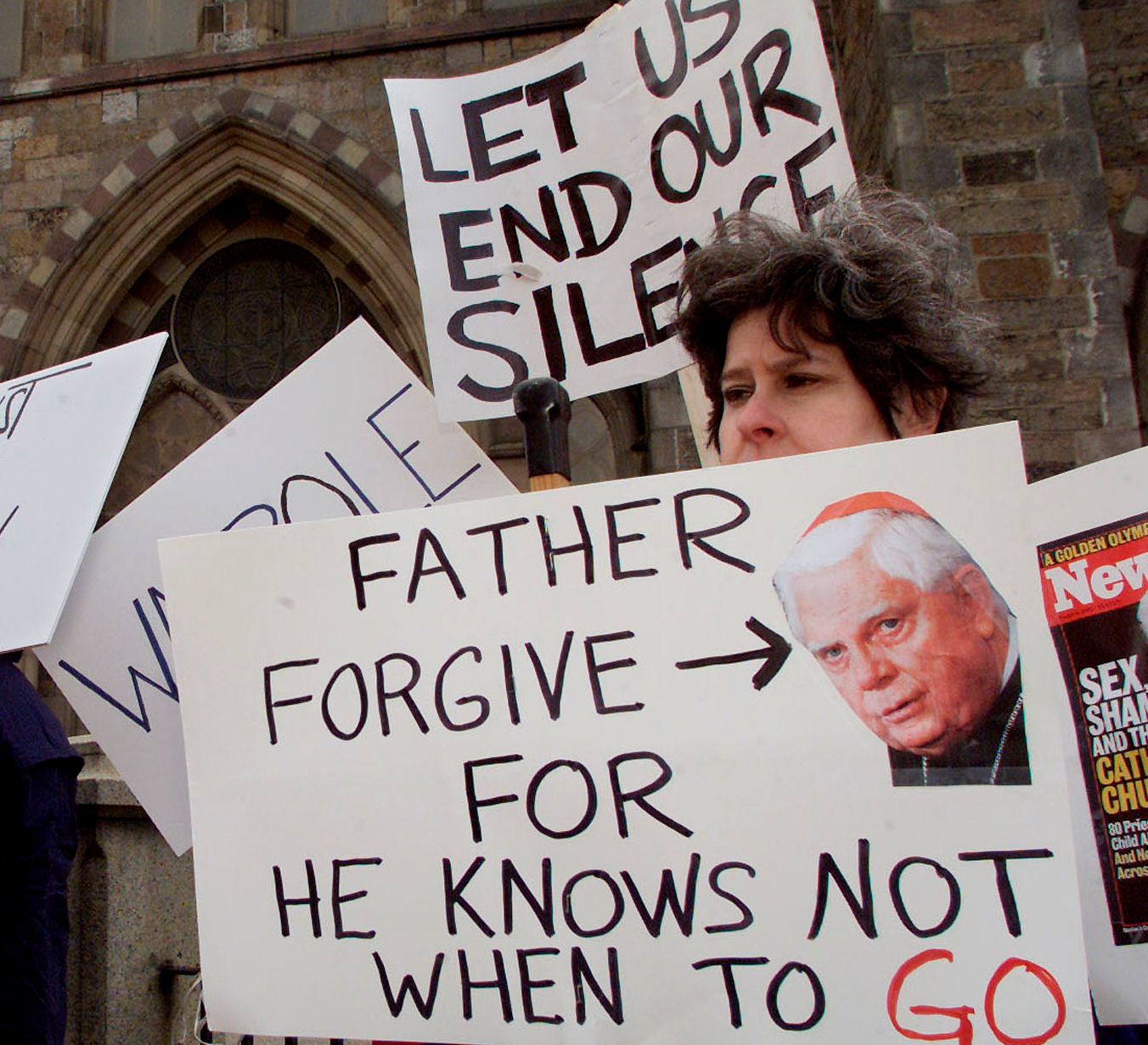Abuse scandal in the Catholic church - where does blame lie?
Updated on 11 June 2010
There have been calls for the Pope to resign over the abuse scandal which has reverberated in many countries around the world. Austen Ivereigh, former advisor to the head of the Catholic Church in England and Wales tells Channel 4 News media focus on Pope Benedict’s role is obscuring the mishandling of cases by the local Church, rather than the Vatican.

Pope Benedict these days spends a lot of time apologising for the sins of his fathers. He has little option, given the intensity of the fury and indignation directed at the Catholic Church for its mishandling of sex abuse.
On Friday, before 15,000 priests – the largest gathering of Catholic clergy in history – he did so again, begging forgiveness from God and from those affected, while promising to do “everything possible” to ensure that such abuse will never occur again.
What action he is promising is not immediately obvious. The intense media focus on Pope Benedict’s role in the crisis, and the calls by victims groups and their lawyers for him to resign, have obscured the fact that the mishandling of these cases in the past was not by the Vatican, but by the local Church, and it is the local Church which has had to put its house in order.
Pope begs forgiveness for priests' sex abuse
http://www.channel4.com/news/articles/world/pope+begs+forgiveness+for+sex+abuse+priests+scandal/3677027
It was the bishops in dioceses who failed to act on the accusations, or who - especially in the 1970s-80s – responded inadequately, shuffling priests between parishes after spells of therapy rather than removing them from active ministry. Rome only entered the picture when a petition to laicise a priest was made by a bishop.
It is now a matter of record that back in the 1980s, those petitions languished. But laicisation made no difference to whether an abusive priest had contact with children; the key decision (removal) was made -or not made – by a bishop. Rome played no part in that process, and the accusation of some US lawyers that there was some kind of Vatican-ordered cover-up is simply baseless.
That doesn’t mean the Vatican’s failure speedily to laicise priests convicted of abuse was not serious. Laicisation is the punishment for abuse of minors called for by the Church’s own law, and not to make use of that punishment – within the Church’s juridical system – amounted to a further injustice and scandal.
It needed putting right and was, by Pope Benedict himself, when, as Cardinal Ratzinger, he introduced sweeping reforms to the laicisation process, enabling priests convicted or convincingly accused of abuse to be summarily dismissed from the clerical state.
The 2001 reforms also included the order that all serious allegations against priests be forwarded to him at the Congregation for the Doctrine of the Faith; there, in its offices by St Peter’s Square, each Friday for four years, he sifted through some 3,000 files, coming to realise the horror and scale of sex abuse of minors in a way that few in the Church – or in wider society – ever have.
Channel 4 Documentary: Deliver Us from Evil
http://www.channel4.com/programmes/deliver-us-from-evil/articles/help-and-supportHere is a
This Pope knows better than almost anyone the addictive, compulsive nature of sex abuse; the devastating impact it has on victims; and the way it is concealed, often for years, beneath layers of shame, denial and complicity of abuser and victim.
It was also in 2001-2002 that the Church in the UK, the US and Ireland began its own sweeping reforms, putting in place procedures and guidelines that are far more thorough and transparent than any comparable institution. Unlike, for example, schools or local councils, which are under no obligation to (and almost never do) publish abuse allegations, the Catholic Church in England and Wales each year publishes a report listing the number of new allegations, whether the abuse is alleged to have taken place yesterday or 30 years ago.
In English-speaking countries, the Catholic Church has become a model of best practice in safeguarding children.
So why doesn’t the Pope order that this same model be extended to the Church in all countries of the world, to ensure abuse cannot be covered up or ignored? It would seem to be the obvious next step, and there have been rumours for some months that a new, “global” policy is being designed by Vatican lawyers.
But it’s more complicated than it looks. Catholics, as good citizens, are obliged to obey the law of their land; the Church’s own law demands it; and there is little point in Pope Benedict saying so. Instructing all the bishops of the world to report all abuse allegations to the police would not, in any case, guarantee that the allegations were acted on: in some countries of the world, sex abuse of minors is not a crime; in others, the police do not bother to act or require bribing to do so. It is a very “Anglo-Saxon” assumption that alerting the civil authorities results in swift and effective action. In some countries, a bishop handing the matter over to police would amount to washing his hands of the problem.
Whether or not a new “global Catholic policy” is coming or is even possible, Pope Benedict can still continue to act, as he promised today.
He can lay siege to a clericalist mentality that prefers to keep everything “within the family” for the sake of the Church’s reputation. He can demand that the voice of the victims always be heard, and write a strong pastoral letter that inaction is never acceptable. And he can continue to listen to the stories of the victims on his visits to different countries, making himself party to their pain and their healing.
And, of course, he will continue to beg forgiveness, on behalf of the whole Church; because saying sorry once just isn’t enough.
Austen Ivereigh is a Catholic commentator and co-ordinator of Catholic Voices (www.catholicvoices.org.uk).



